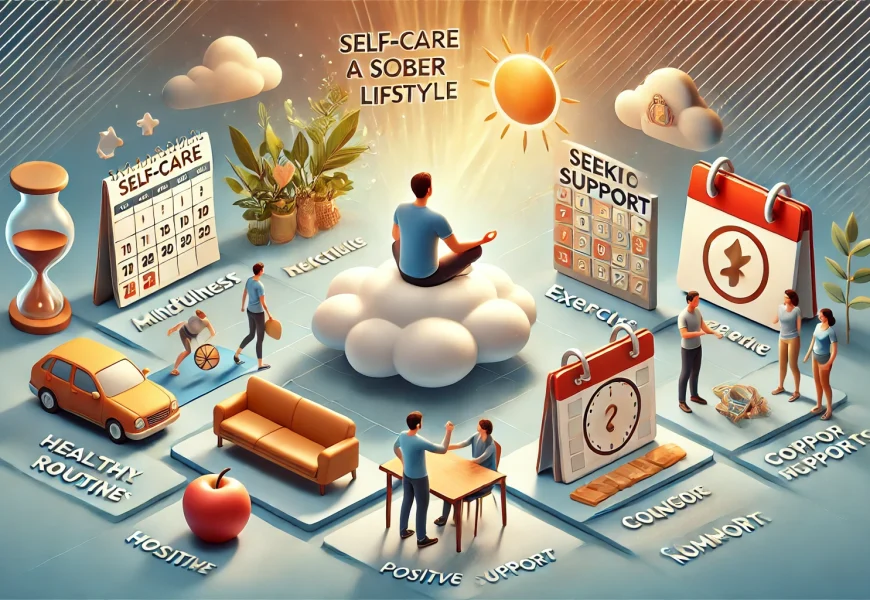https://ghaniassociate.com/advantages-of-virtual-neurology-consultations-for-migraines/Embracing a sober lifestyle is one of the most rewarding decisions you can make for your health, well-being, and overall quality of life. Whether you’re in recovery from alcohol addiction or simply choosing to avoid alcohol for personal reasons, maintaining sobriety requires commitment, focus, and a variety of healthy coping strategies. While the journey may not always be easy, there are numerous effective strategies that can help you stay on track and lead a fulfilling, sober life.
In this blog, we’ll explore practical and actionable tips for maintaining a sober lifestyle, emphasizing the importance of hydration and self-care. We’ll also offer insights on the mental and emotional aspects of sobriety, provide advice on navigating social situations, and share guidance on building a strong support network. If you’re looking for more comprehensive resources on quitting alcohol, you can also explore How To Stop Drinking Alcohol Permanently.
1. Stay Hydrated to Support Your Sobriety
One of the most important yet often overlooked aspects of a sober lifestyle is the role of hydration. After quitting alcohol, it’s essential to stay hydrated to help your body detoxify, restore balance, and recover from the effects of alcohol on your organs and tissues. Drinking enough water also supports mental clarity, reduces cravings, and promotes overall physical well-being.
Alcohol dehydrates the body, leading to fatigue, headaches, and dry skin. By making hydration a priority, you’ll not only help your body heal but also reduce the likelihood of mistaking thirst for cravings.
Hydration Tips for a Sober Lifestyle:
- Drink water consistently throughout the day: Aim to drink at least eight 8-ounce glasses of water daily. You may need more if you’re exercising or live in a hot climate.
- Replace alcoholic beverages with water or herbal tea: If you miss having a drink in your hand at social events, carry a bottle of water or a non-alcoholic beverage like herbal tea or flavored water.
- Eat hydrating foods: Incorporate fruits and vegetables like watermelon, cucumbers, and oranges into your diet to stay hydrated.
Proper hydration is a critical part of maintaining a sober lifestyle and can help ease the transition into a healthier, alcohol-free way of living.
2. Set Clear Goals and Reminders
Maintaining sobriety requires intentionality, which starts with setting clear goals. Whether your goal is to remain sober for a specific event, a week, a month, or for life, writing down these goals can serve as a constant reminder of your commitment to a sober lifestyle. Having well-defined objectives helps you stay focused, especially during challenging times.
Tips for Setting Sobriety Goals:
- Start small: Break your long-term sobriety goals into smaller, manageable steps. For example, you could start by setting a goal to stay sober for 30 days and then extend it as you build confidence.
- Use visual reminders: Create a vision board, journal, or use sticky notes around your home as reminders of why you chose to lead a sober lifestyle.
- Track your progress: Keep a log of your sober days, and celebrate milestones, whether it’s a week, a month, or a year of sobriety.
By setting clear goals, you can maintain a positive mindset and stay motivated as you work toward long-term sobriety.
3. Build a Strong Support Network
A solid support network is one of the most important resources for maintaining a sober lifestyle. Surrounding yourself with people who support your decision to quit alcohol can help you stay accountable, offer encouragement, and provide emotional support during difficult moments.
Your support network can consist of family members, friends, therapists, support groups, and anyone else who understands your journey and wants to help you succeed.
Strategies for Building a Supportive Circle:
- Attend support groups: Join local or online support groups, such as Alcoholics Anonymous (AA) or SMART Recovery, where you can connect with others on a similar journey.
- Lean on trusted friends and family: Share your goals with supportive loved ones who will encourage your sobriety and respect your boundaries.
- Consider professional counseling: Therapy can help you develop coping strategies, manage stress, and address any underlying issues that contributed to your drinking habits.
Having a network of people who genuinely care about your well-being will make it easier to navigate the challenges of staying sober.
4. Learn Healthy Coping Mechanisms
Life comes with its share of stress, challenges, and emotional ups and downs. In the past, you may have turned to alcohol as a way to cope with stress, sadness, boredom, or anxiety. Part of maintaining a sober lifestyle involves developing healthier ways to cope with life’s difficulties.
Healthy Coping Strategies:
- Exercise regularly: Physical activity, whether it’s going for a walk, practicing yoga, or lifting weights, is an excellent way to reduce stress and improve your mood without relying on alcohol.
- Practice mindfulness: Meditation, deep breathing, and mindfulness exercises can help you stay present, reduce anxiety, and prevent cravings.
- Engage in creative outlets: Hobbies like painting, writing, playing music, or gardening can provide a positive outlet for your emotions and keep your mind occupied.
- Talk it out: If you’re feeling overwhelmed, talk to a therapist, sponsor, or trusted friend. Vocalizing your feelings helps process them in a healthy way rather than turning to alcohol.
By adopting these healthier coping mechanisms, you can effectively manage stress and stay committed to your sobriety goals.
5. Avoid Triggers and Risky Situations
Avoiding triggers is essential to maintaining a sober lifestyle, especially in the early stages of recovery. Triggers can be people, places, or situations that remind you of your past drinking habits and can make you feel tempted to drink again. Identifying and avoiding these triggers will help you stay on track.
Tips for Avoiding Triggers:
- Identify your triggers: Reflect on the situations, people, or emotions that lead you to drink. Is it stress from work? Peer pressure from certain friends? Once you identify them, make a plan to avoid or manage them.
- Limit exposure to alcohol: Avoid environments where alcohol is the main focus, such as bars or parties, especially in the early stages of your sobriety.
- Bring a sober buddy: If you must attend an event where alcohol will be present, bring along a supportive friend who will help keep you accountable.
Steering clear of triggers will reduce the risk of relapse and allow you to focus on building healthy, sober habits.
6. Create New Social Habits
For many people, drinking alcohol is often intertwined with social events, making it challenging to maintain a sober lifestyle. However, living sober doesn’t mean you have to give up socializing—it just requires a shift in your approach to social activities.
How to Build Sober Social Habits:
- Plan alcohol-free activities: Organize gatherings that don’t involve alcohol, such as movie nights, game nights, hiking trips, or going out for coffee.
- Say no to alcohol with confidence: If someone offers you a drink, be prepared with a polite but firm response. You can say, “No, thanks. I’m not drinking,” or simply order a non-alcoholic drink like soda, water, or juice.
- Find sober communities: Join sober social groups or activities in your area or online, such as fitness classes, book clubs, or sober meet-ups.
Creating new, enjoyable social habits that align with your sober lifestyle will make it easier to maintain sobriety and have fun without alcohol.
7. Focus on Self-Care
Self-care is an essential component of a sober lifestyle. Taking time to prioritize your physical, emotional, and mental well-being can help you stay balanced, reduce stress, and improve your quality of life. When you feel your best, you’re less likely to turn to alcohol for comfort.
Self-Care Practices for Sobriety:
- Get enough sleep: Ensure that you’re getting 7-9 hours of restful sleep each night to support your physical and mental health.
- Eat a balanced diet: Fuel your body with nutritious foods that provide the energy and nutrients you need to thrive.
- Take time for yourself: Whether it’s practicing a hobby, reading a book, or relaxing in a bath, make sure to carve out time for activities that bring you joy and relaxation.
By prioritizing self-care, you can build resilience and maintain your commitment to living a sober lifestyle.
Conclusion
Maintaining a sober lifestyle is a journey that requires commitment, support, and self-care. By focusing on hydration, setting clear goals, building a strong support network, and learning healthy coping mechanisms, you can successfully navigate the challenges of sobriety and enjoy a fulfilling, alcohol-free life.
For More :https://ghaniassociate.com/top-ways-to-strengthen-your-immune-system-naturally/




















